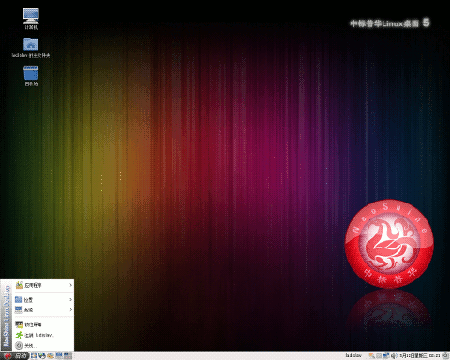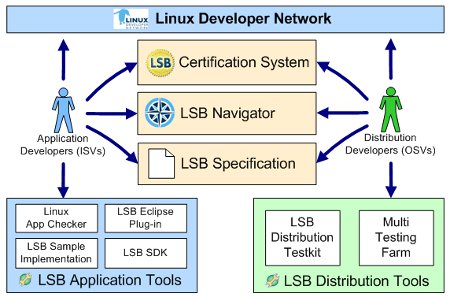LSB 4.0 certifications aim to heal Linux fragmentation
Dec 8, 2010 — by Eric Brown — from the LinuxDevices Archive — 9 viewsThe Linux Foundation (LF) announced that nine major Linux distros have been certified to Linux Standard Base 4.0 (LSB 4.0), said to confer application portability. While announcing LBS 4.0 registrations for Canonical, Kylin, Linpus, Mandriva, Neoshine, Novell, Oracle, Red Flag, and Red Hat, the LF also released a beta of LSB 4.1.
Linux Standard Base 4.0 certification has been registered for Linux distros from nine organizations (see farther below for LSB background). These include the big three Linux server distributions: Red Hat Enterprise Linux 6.0, Novell's SUSE Linux Enterprise 11, and Oracle's RHEL-flavored Enterprise Linux Server 5.3.
In addition, registration has been cited for two somewhat dated versions of the leading desktop Linux distro, — Canonical's Ubuntu 8.04 and Ubuntu 9.04 ("Jaunty Jackalope").
Other Linux distros that are said to measure up to LSB 4.0 specs include Kylin 3.1 (Server), the MeeGo-compatible, netbook-oriented Linpus Lite 1.3, Chinasoft's NeoShine Linux Desktop 5 (pictured below), and Mandriva Enterprise Server 5. The latter is the sole remaining asset of struggling French software firm Mandriva, which recently saw its desktop distro fork off into a Mageia Linux project.

NeoShine Linux
Source: DistroWatch
While the main focus of LSB is on desktop and server distros, embedded Linux distros have also claimed LSB support, although none are on the current 4.0 registry.
When Wind River announced Wind River Linux 4 in October, the Intel subsidiary said the commercial Linux distribution would support LSB 4.0 certification requirements. Meanwhile, rival, Cavium-owned MontaVista Software has also claimed LSB compatibility in the past for MontaVista Linux Carrier Grade Edition.
4.1 beta arrives
The Linux Foundation also released a beta of the LSB 4.1, and is soliciting feedback from the public prior to the official release expected in January.
The LSB working group has yet to write up release notes, but its 4.1 project page shows high priority items including new interfaces for LSB's App Checker and an ALSA test suite based on T2C. Medium priority tasks are said to include printing spec enhancements, as well as "LSB SANE," also aimed at printer driver issues.
Background
The LSB spec outlines interoperability between applications and the Linux operating system, "allowing application developers to target multiple versions of Linux with just one software package," says the LF.
Launched in the late '90s, the LSB working group released its first major LSB 1.1 specification in 2001. In 2004, it released LSB 2.0, adding a C++ ABI (application binary interface) and support for 32-bit and 64-bit hardware architectures.
In late 2008, the Linux Foundation (LF) released a beta of the current LSB 4.0, adding developer tools such as a new shell script, application checkers, and cryptography support.

LSB 4.1 deliverables
(Click to enlarge)
The LSB specification is said to include both mandatory and trial use modules, with the former imposing mandatory requirements on LSB compliant distributions. As a result, "applications may safely rely on the functionality described in mandatory modules," says the LF.
Trial use module functions, which represent candidates for inclusion in future LSB versions, are not required in LSB compliant distributions, say the organization.
LSB aims to reduce Linux fragmentation
The LSB is intended to solve the challenges confronting ISVs and individual developers trying to stay compatible with the proliferation of endlessly changing Linux distributions, says the LF. By reducing the differences among individual Linux distributions, the LSB "significantly reduces the costs involved with porting applications to different distributions, as well as lowers the cost and effort involved in after-market support," says the organization.
This is the goal, anyway. As Sean Michael Kerner notes in an InternetNews blog posting on the announcement, while the LSB helps to reduce fragmentation, it does not eliminate it.
"The issue of packaging and broader dependencies is still a big one (for me) at least," writes Kerner. "The same RPM that I get for Fedora won't work on Ubuntu, and Ubuntu DEB packages won't work on SUSE etc etc."
Kerner goes on to note, "It's not clear to me that LSB is so enforceable that ISVs or even distros are actually taking all necessary steps to make sure their apps don't rely on libraries that are only on one platform or another."
Kerner also wonders why it took so long to achieve certification, considering the spec has been available for almost two years.
All that said, he adds that the situation could be a lot worse without LSB. "The work of Linux standards is a moving target and it's great to see that the Linux Foundation is continuing to push them forward."
Stated Jim Zemlin, executive director at the Linux Foundation, "The distribution community has worked together on the [LSB] standard and all are certified. This is good for the Linux community, good for Linux customers and good for Linux vendors."
Availability
The list of LSB 4.0 certified Linux distributions and applications may be found here. More information for LSB 4.1 beta, as well as links to downloads may be found here.
This article was originally published on LinuxDevices.com and has been donated to the open source community by QuinStreet Inc. Please visit LinuxToday.com for up-to-date news and articles about Linux and open source.